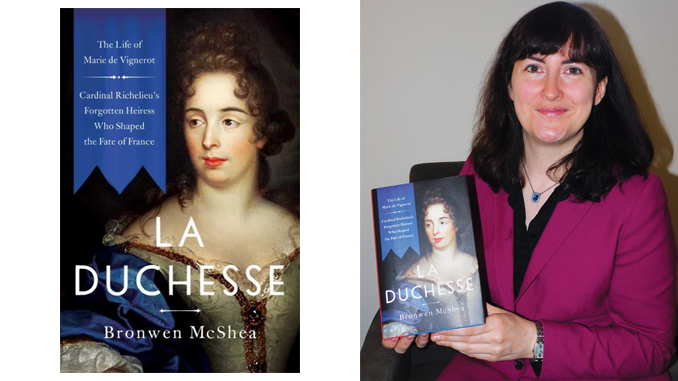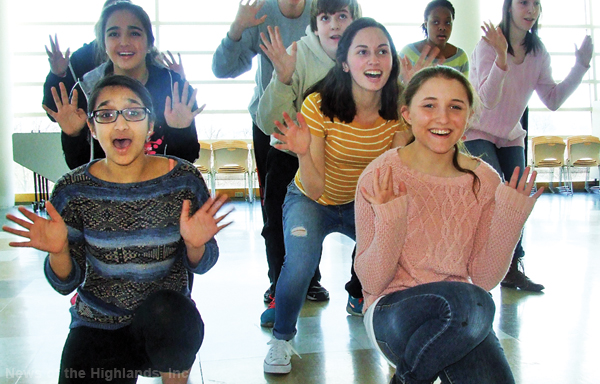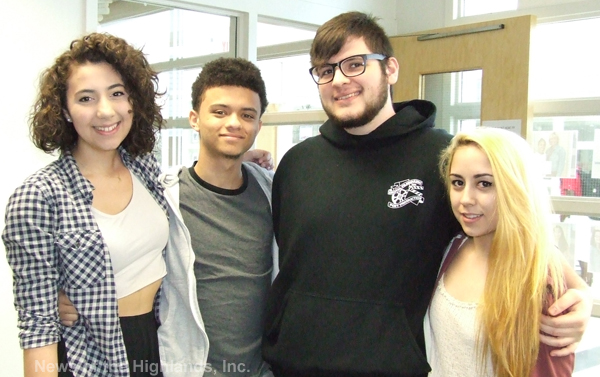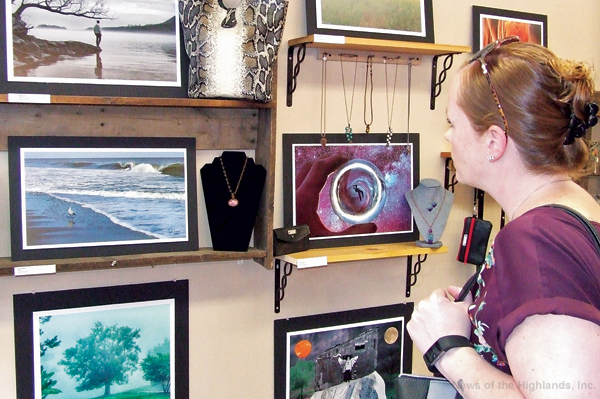
Bronwen McShea’s most recent work is about Marie De Vignerot
Bronwen McShea, a 1998 Cornwall High School graduate has two published books to her name and a third is in the very early stages. “La Duchesse,” which tells the story of Marie de Vignerot, hit bookshelves earlier this year.
After high school, McShea went to Harvard and graduated in 2002 with a degree in intellectual history. She briefly worked for a non-profit before going back to school. McShea applied for a Masters Degree program at Harvard Divinity School and in 2005 received her degree in the history of Christianity. From there she went straight into a PhD program at Yale and finished in 2011.
“Even as a kid, I just liked to get absorbed in past centuries,” McShea said. “I really loved movies and things that went back in time. I wanted to know what people were like in past centuries. It wasn’t a question that I would major in history.”
Following grad school, McShea held several different positions. She spent a year in Germany as a postdoctoral at the Institute of European History. It was there she began turning her dissertation into what would become her first book. Research entailed traveling back and forth between France and Germany.
McShea taught history briefly at Boston College and Columbia University and was a visiting professor at the University of Nebraska Omaha. From 2018 to 2020, she worked at Princeton before the COVID-19 pandemic hit.
During the pandemic, she was hired by her current employer, the Augustine Institute in Colorado. McShea works remotely, but does fly out every few months for intensive in-person teaching. It was also during the pandemic she began writing for “First Things” magazine and finished her first book, “Apostles of Empire: The Jesuits and New France.” The book is a history of the French Catholic missions in the 18th century in Canada and parts of England.
While in graduate school, McShea developed an interest in French history, specifically the 17th century. A series of assignments led her down the path and when it was time to pick a dissertation topic while at Yale, she had a desire to learn more about the French roots of North American history.
“I heard, as a kid, a lot about the English and Spanish, but not as much about the French. I was fascinated by the French encounters with Native Americans and the whole history of French ambitions in North America. I zeroed in on these missionary sources which are some of the best primary texts to read for that period. Missionaries are writing all the time.”
Due to the fact Native Americans didn’t have a written history, McShea had to rely on these mission sources to get any perceptions of Europeans on the Native American side and vice versa.
While conducting research for the first book, McShea stumbled upon Marie de Vignerot, the duchess of d’Aiguillon and one of the primary donors to the French missions from the 1630s to her death in 1675. She founded the first charitable hospital in North America.
Curious about the woman, a file was kept on her. McShea pondered why she was involved in overseas affairs when most women during this period in time were focused on attending balls and who was being invited to what party.
“I started to come across fascinating information about her and started writing the second book before finishing the first because I knew I had a gold mine with this woman.”
When McShea began her research, she found very little about de Vignerot, but she learned more through various footnotes and a 1979 French biography written about her. Besides becoming a duchess later in life, she was the niece of Armand-Jean du Plessis, the Cardinal-Duc de Richelieu, who was one of the wealthiest men in Europe.
“I started to quickly realize she was one of the most important people in French history at the time and she was just completely sidelined, partly because she was a woman. I don’t blame the French. It’s not their fault. She was remembered before the French Revolution, but forgotten in modern times. I think the celebrity of her uncle overshadowed her story. When he died, she inherited most of his vast fortune and his political network. She ends up having a major impact on French history in the 17th century. Once I saw the data, I was even more shocked she could be forgotten the way she was. I felt an obligation to bring this woman’s story to light.”
Both books are works of nonfiction, but the way the narrative is written, especially in the second book, it reads more like a story.
When McShea’s publisher committed to her, it was with the expectation she was going to make the story readable for people who may not necessarily be interested in that time period. The goal was to teach readers about French history without making it seem like they were learning anything.
The book took about eight years to finish including all the research and the writing. McShea found the research aspect to be both easy and difficult. Some archives had developed search systems which made finding materials seamless. However, McShea discovered there was a lot more material on de Vignerot than she originally anticipated, so it took some time to sift through everything.
“My favorite document I came across was her last will and testament written in her own hand. You get a sense of the empire she built up because she’s giving her final gifts to hospitals, convents, missions, schools. She built up a tremendous infrastructure of charitable institutions, not just in France, but other countries too.”
“La Duchesse” is available for purchase online through Amazon or Barnes & Noble.
McShea’s next project is a short book about the history of Catholic women. She was asked by Ignatius Press to contribute to a series of books called “What Every Catholic Should Know.” Her next research project is still undefined, but it will focus on the French Revolution and the Napoleonic Era.



